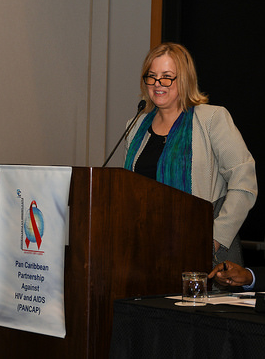
Remarks by Ms Annelise Hirschmann, Regional Manager for Latin America and the Caribbean, The Global Fund on the occasion of the Sixth Meeting of National AIDS Programme Managers and Key PartnersRepublic of Trinidad and Tobago, March 12 - 14
Honorable Minister of Health of the Republic of Trinidad and Tobago, Terrence Delyasingh, Honorable Minister of Education of Guyana, and RCM Chair Nicolette Henry, partners, NAPS directors, civil society, friends.
It is a great pleasure for the Global Fund to be a sponsor of this important meeting through the PANCAP regional program. Those in this room have a great responsibility and opportunity to lead the HIV response in this region and we are very happy to be a part of this meeting.
As I read through the Concept Note and agenda for the next three days I was excited to see that there would be a real opportunity to discuss challenges, share best practices and look at some important innovative approaches.
The Caribbean has some important successes, elimination of mother to child transmission and congenital syphilis in 7 countries, access to treatment has doubled, adherence to test and treat in eight countries. All work that countries have led- Important achievements to celebrate.
Despite these successes, this meeting is also a place to discuss and define a path for the challenges ahead and to ask some important questions at individual country and regional level –
1) How can we move to achieve 90-90 -90 targets? Do we know what our treatment cascades look like? Do we have a key pops treatment cascade? Are we using this to make important decisions on where to best invest donor or domestic resources?
2) Data? Do we have it? Do we have the right data? Are we using it to shape our decision and drive for domestic financing and investing it effectively?
3) Are we looking at our strategy and ensuring that it is sustainable? Are we planning effectively as donors reduce resources in the region?
4) What are the real barriers to reaching our targets? What role does stigma and discrimination play? What are we doing to reduce human rights violations, and involving communities and civil society, key communities in the response?
5) What role can innovative approaches play in the response? Self-testing, Prep, and others?
6) What other actors can we integrate into the response? Does and can the private sector play a role?
And finally, how can we as partners and donors support you in achieving these results?
I am looking forward to this opportunity over next three days where rich discussion, information sharing and planning and hopefully collectively ensure we leave having responded some of these questions.
WHAT IS PANCAP?
PANCAP is a Caribbean regional partnership of governments, regional civil society organisations, regional institutions and organisations, bilateral and multilateral agencies and contributing donor partners established on 14 February 2001. PANCAP provides a structured and unified approach to the Caribbean’s response to the HIV epidemic, and coordinates the response through the Caribbean Regional Strategic Framework on HIV and AIDS to maximise efficient use of resources and increase impact, mobilise resources and build the capacity of partners.
What are the Global AIDS Strategy 2021–2026 targets and commitments?
If targets and commitments in the strategy are achieved:
- The number of people who newly acquire HIV will decrease from 1.7 million in 2019 to less than 370 000 by 2025
- The number of people dying from AIDS-related illnesses will decrease from 690 000 in 2019 to less than 250 000 in 2025.
- The goal of eliminating new HIV infections among children will see the number of new HIV infections drop from 150,000 in 2019 to less than 22,000 in 2025.
What are the 95-95-95 Targets for ending AIDS?
- 95% of People Living with HIV know their HIV status;
- 95% of people who know their status on treatment; and
- 95% of people on treatment with suppressed viral loads.
HELPFUL LINKS:
Global AIDS Strategy 2021–2026, End Inequalities, End AIDS
https://pancap.org/pancap-documents/global-aids-strategy-2021-2026-end-inequalities-end-aids/
Caribbean Regional Strategic Framework on HIV and AIDS (CRSF) 2019-2025
https://pancap.org/pancap-documents/caribbean-regional-strategic-framework-2019-2025/
